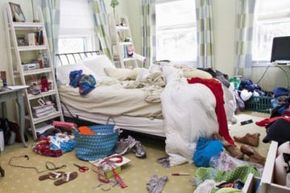Society can condition, berate and bully us into believing that clutter is bad. But that's not always true. Clutter builds up from time constraints, creativity and consumerism. Must-do items that you don't have time to complete just now go into a pile on the kitchen table. In-progress projects occupy a corner of the living room. Over-abundant clothing, DVDs and small appliances ooze beyond their storage units.
Messiness can cause stress and lower your self-image, but in many cases, the negative feelings about your home organization stem from worrying about how others perceive your clutter. Humans are innately organized, but we all have different styles. Some see clutter as a failure of home cleaning. Moderate clutter, however, might be the by-product of a high-functioning, well-engaged, highly organized mind. The question to ask isn't whether your clutter disturbs someone else, but whether it functions for you.
Advertisement
Some people want or need visual reminders. Having a pile of bills on the table that reminds you to pay them is far better than neatly filing them out of sight and forgetting to pay them. The person who spends time working on a project but leaves all of his or her tools on the table accomplishes more than someone who puts everything away, and then has to expend more time and energy digging it all back out before resuming work.
So when is clutter bad? For some people, clutter is a symptom of compulsive hoarding, an obsessive-compulsive disorder. Both excessive organization and excessive clutter are pathological; the main difference is that homes of neat people don't usually annoy neighbors or become news features. While most people find a healthy balance between organizing their house and enjoying living in it, here are some indicators that clutter is taking over:
- Your organized mess becomes a disorganized mess
- Your piles stop cycling and start growing in height and number
- Your household system ceases to function
- Clutter inhibits creativity rather than facilitating it
- Clutter impedes daily activities
- Bugs and larger pests make homes in your clutter
- Your friends arrange an intervention
Moderate clutter is normal, but excessive clutter harms your emotional, physical, financial and social health. It lengthens simple tasks and can make you feel incompetent. When piles swallow up bills and your payments are routinely late, your credit suffers. Shame over an excessively messy home can distance you from friends. Clutter that never moves collects allergy-inflaming dust and disease-bearing vermin.
For lots more information on creating a healthy home, see the next page.
Advertisement

